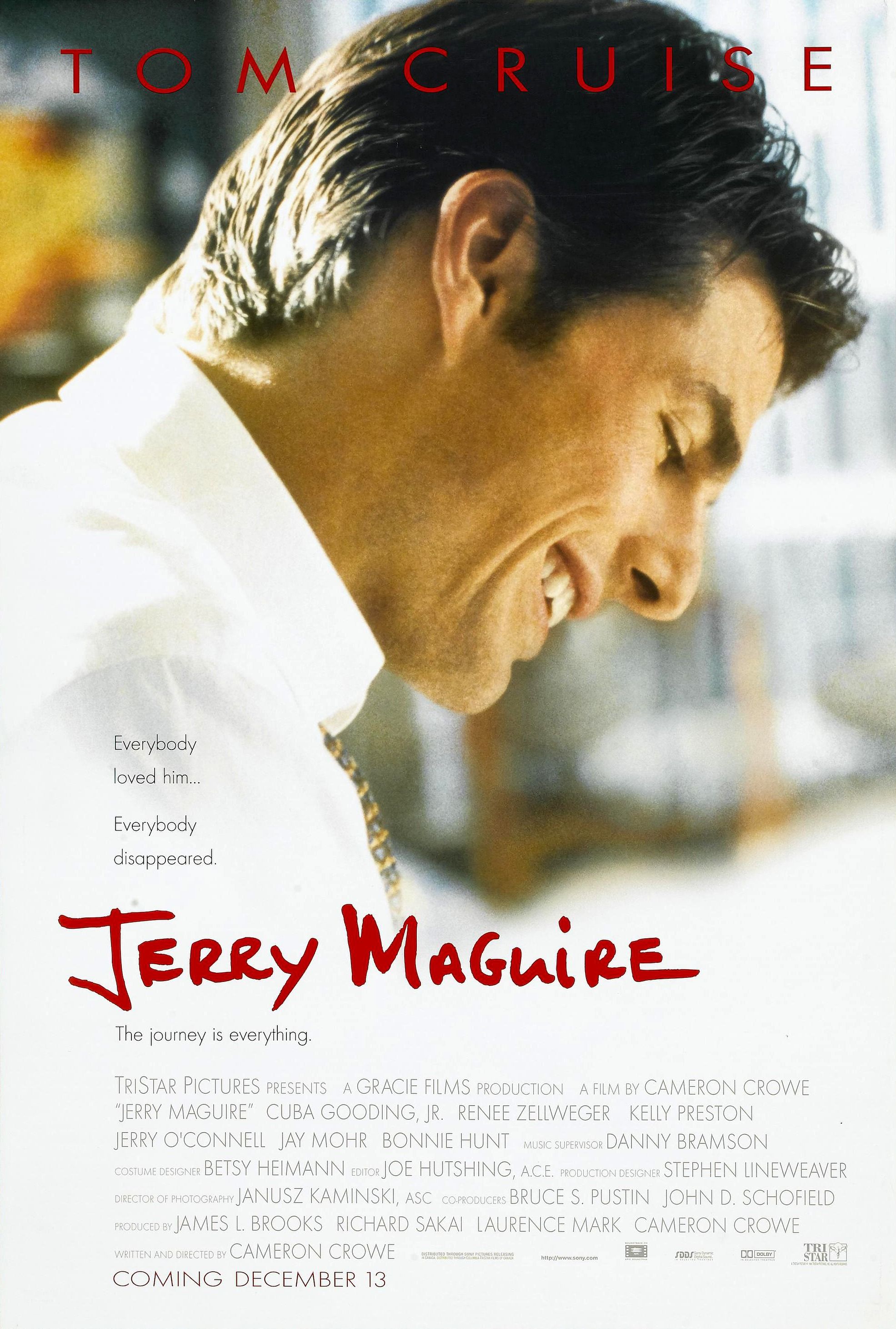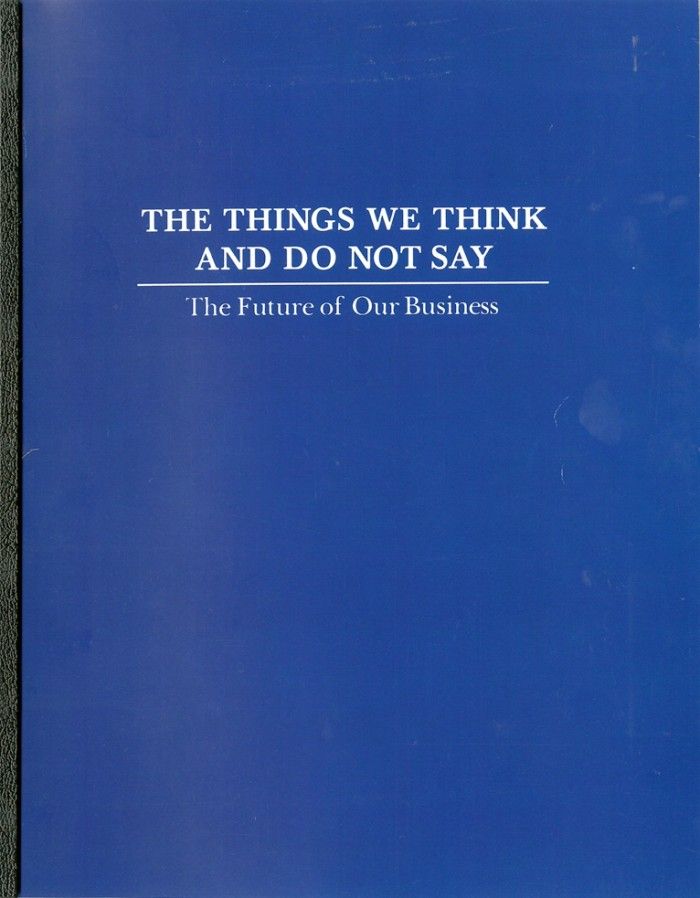Are you frustrated by how your company is currently executing? Or you just want a specific promotion?
Remember how Jerry Maguire, frustrated by his company's strategy & execution, wrote passionately a new mission statement for how things should be?

Credit: TriStar Pictures
Well, it did not go well for him - at least not the way he did it.
But I can attest that it is a worthwhile play, which I have done twice in my career - albeit slightly differently.
Spending countless hours feverishly writing a plan of what I would do, if I would be in a position to do things my way. Which I then handed over to the CEO.
Both times getting a promotion as a result.
Inspired others
It did not just work for me. I even had someone in my team do it to me.
He was unhappy in his position, not tapping fully into his potential. He wanted a different role, moving from Sales to Marketing.
After a long 1:1, he spent a sleepless night writing. And showed up the next morning with a fleshed out plan.
He got the role he was longing for.
How Jerry Maguire did it
In the movie, the character played by Tom Cruise, Jerry Maguire, is a sports agent who grew tired of his company's focus on the business side, ignoring the human side.
In a breakthrough moment - and not a breakdown as he insists - he spent an entire night putting his thoughts down to paper, about how he thought his company, and his industry as a whole, should change.

Credit: TriStar Pictures
In the morning, he printed it out and distributed copies in his company.
The idea for the movie was reportedly influenced by a memo statement sent out by Jeffrey Katzenberg, in 1991 when he was chairman of Disney. He wrote an epic 28-page memo, calling for Disney to return to its roots — less reliance on movie stars and spectacle, more focus on storytelling.
You can read the actual - well, you know what I mean - mission statement from "Jerry Maguire" on Cameron Crowe's blog (the film's director) here:
"The Things We Think and Do Not Say: The Future of Our Business"

The key thing here being that it's an "open heart" statement. Just like Katzenberg's, it is calling for a return to their core values.
But coming from "just" an individual contributor in the company.
How to make it work for you
The short version:
- writing an action plan rather than a values-driven manifesto
- sleeping on it
- not distributing it to everyone
Here's why. And how.
Action Plan rather than a values-driven manifesto
It is a company's leader's role to define and shape the company's culture. As such, Katzenberg was in the right position to issue his mission statement. But coming from anyone else, such an initiative would probably fall flat.
The first step is to define what you want to achieve for your company.
If you are so passionate as to act on that play, it probably means you have the drive - if not the experience, yet - to lead the changes you have in mind.
So you want a promotion.
Rather than writing a mission statement, you want to paint a picture of what the company (or your business unit) would look like, by implementing your ideas.
So rather than something focused on values, focus should be on an actionable plan for what you would do, if you would be in the position you covet.
A few suggestions:
- outline the challenges and negative impact on bottom line/revenues/customers/employees (in that order preferably in most companies).
- paint a picture of how things should be and the expected results.
- then dive deep into each area, with clear action points. It needs to be a structured document, rather than a novel (ironic, I know considering the length of my posts! 😇 I spend a lot/too much time myself adapting my natural flow and verbosity to executive-style communications. There, I did it again 😅).
- be blunt about the expected challenges to transition to your vision. It will show that you have a realistic outlook, not (just) an idealistic one.
- outline how your knowledge/skills/personality will help you lead this plan to reality, and how/what you will be accountable for (ideally define clear targets you are ready to personally commit to).
- use bullet points and short sentences wherever possible rather than long sentences.
- once finished, include the best executive summary you can on the 1st page. Not everyone might/will read through it all (and that's fine).
- and add a table of contents to help with both overview and navigation.
Whatever your current position, as you’re aiming for a promotion, it means your plan will encompass areas where your knowledge is limited to non-existent.
So working on such a structured plan helps you identify your gaps, and this informs what you need to learn to round up your profile. See #CareerPLaybook 001 for actionable tips once you have them identified.
You can also have informal conversations with your colleagues in charge of the remits outside of yours/your department's, and get inputs as to what they would do - based on their knowledge on the front line. This is what a leader does, so it can, and should, be part of your plan.
It will help inform your plan better. And show that you have both a high-level, and low-level, understanding of all the remits you are looking to lead in the role you are coveting.
Exchanging with your colleagues will also help building bridges. Which is useful even if your Jerry Maguire plan does not yield the expected result. And paves the way for your collaboration when they will be working in your team, should you be successful.
Sleeping over it
The second thing Jerry Maguire perhaps did that is a red flag to me, is spending a sleepless night and distributing it the next morning.
In that state, you cannot think clearly.
You miss taking a step back and thinking about the potential impact of what you wrote.
Such an important document should be thought through from all perspectives.
What will people say?
How can you support or bulletproof some of your points?
How can you appear as being the right person to execute on this action plan?
In one case, I started and fleshed out a lot of my plan during a 2-weeks paternity leave. Not that I recommend you working during your own parental leave (that was not one of my best decisions - I’ll address this in a future post) but the point is, the bulk of it was written across 2 weeks.
I then tweaked it further during the first two weeks back in the office, taking other inputs I was missing when away.
All in all, it took me a month to get something I felt comfortable sharing with my CEO.
Not one night.
No need to overthink it though (which I am guilty of at times). No plan is perfect, especially not one that has been built in a silo, not yet bulletproofed by the review of others. It's just about ensuring it is well planned and structured from all angles you can think of. And not misguided by emotions.
If you can, have someone you trust, someone unbiased if possible, review it and provide you with feedback.
Restricting distribution
Jerry Maguire distributed his memo to everyone in his company. It sort of makes sense considering it was meant to influence the company’s culture.
But as discussed above, Jerry Maguire was only an individual contributor.
It puts your leadership in a tough spot if everyone has a read of your plan.
It makes it about you, rather than a plan your leadership had in the first place.
If you would get the promotion on the back of it, it would set a precedent that your leadership might not want to set. Showing everyone that writing down your plan is the way to get a promotion. Leading to frustrations and challenging management situations if it’s then done by a lot of people.
It plays against you.
Also, your action plan might include moving people’s position, or even letting some people go. Mine did.
So it is not something you’d want to share broadly.
It is something to share behind closed doors, just like most executive documents. Limiting its circulation is a safer and more respectful way to do it.
Else it is the equivalent of shouting from the rooftops that you do not agree with the company's current execution - at least that can be the perception - which will work against you, just like it did for poor Jerry.
And it's perfectly fine - better even - if the appearance remains that it was the leadership's initiative to promote you in the first place.
Restricting distribution to someone high enough to make the change happen - ideally your CEO if you can - is therefore the way to go.
Have your Jerry Maguire moment
So are you frustrated by how your company is currently executing?
Or you just want a specific promotion?
The Jerry Maguire play could unlock it for you.
The key things to do differently than Jerry are:
- writing an action plan rather than a values-driven manifesto
- sleeping on it
- not distributing it to everyone
Worst case, it will not work at all - which you could see as a sign to find a better path, elsewhere.
Just keep in mind that results might not be immediate though. You will have planted a seed. Provided tangible proof that you think "big picture" - beyond your own role. Your "aura" - thus value - in the leadership's eyes will have increased.
If you feel it has not worked the way you intended, make sure to ask for feedback - see #CareerPlaybook 005: Asking for blunt feedback (and how to handle it). Just know that that alone is positive progress. And use this feedback loop to continue learning.
And in any case, the process itself will have been valuable to you, as you will have gained knowledge, built bridges, and structured your own thoughts. Which all should contribute to your growth.
Don't just wait for things to change, act on it.

